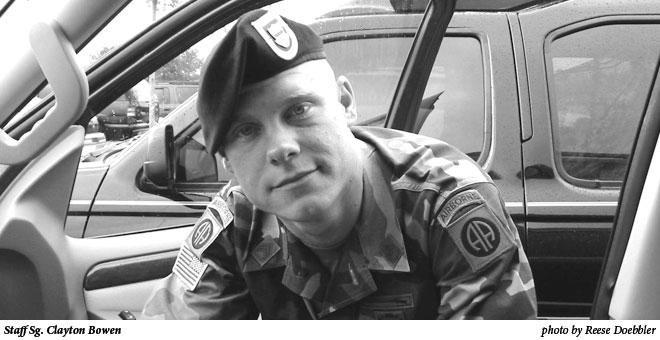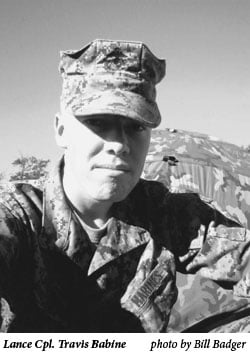What Did He Die For?
Texans Mourn—And Wonder
Men in work boots laid their cowboy hats on the floor and snuggled beside prim women and impeccably suited Marines at the First Baptist Church in Smithville on Nov. 6. They had come to mourn Cpl. Cody Roberts Stanley. Cody, as most of them knew him, had died a week before, nearly 8,000 miles away in Helmand Province, Afghanistan. Outside the church, crowds of aging veterans and neighbors lined the streets holding flags. Harley-Davidsons rumbled in the back of the parking lot; about 80 Patriot Guard Riders had shown up to pay their respects.
Over the low rumble, some of Cody’s favorite songs played on a CD along with a slideshow in the church: “Low,” a popular hip-hop song, and “Copenhagen,” a country tune about Cody’s favorite chewing tobacco. They were not your typical funeral hymns, for sure. But they were reminders that this man’s life had been snuffed out at the tail end of his youth.
“We feel blessed to have had him for almost 22 years,” his mother, Wendi Stanley, says during the service.
As the funeral procession passed out of town toward a small cemetery near Lockhardt, flags grazed lawns and signs read, “We love you Cody.” Elementary school children waved and saluted.
Later in the afternoon on Smithville’s Main Street, merchants gathered outside the grand opening of a gift shop. Most everyone had a personal connection to the wars. “It definitely brings it home when something like this happens,” says Stephanie Murdy, who was visiting from Houston. Murdy has a daughter serving in Afghanistan. “I really empathize with Cody’s mother, so much. What you do is compartmentalize that part of your life—put it out of your mind when you have to do other things. But it’s always there.”
In small towns like Smithville where many people have family members and friends in the military, you don’t hear a lot of anti-war sentiments spoken out loud. But across from the gift shop, Joyce Hart, a senior citizen selling raffle tickets, did not hold back. “I hate war. I hate these two wars,” she says. “I think it’s really tragic for those parents that lost their son, and all the other parents who lost their sons and daughters. I want it to stop.”
Families United by Grief
On Aug. 18, staff Sgt. Clayton Bowen of San Antonio was riding in a humvee in Paktika Province, Afghanistan, on a mission to secure the area for the upcoming national elections.

Blessed with good suspension, the three vehicles in front of Bowen’s made it over an IED unscathed. But Bowen’s vehicle was a rougher ride, triggering a deadly explosion.
Staff Sgt. Michael Murphrey of Snyder, riding in one of the other vehicles, helped get Bowen and his compatriots out of the burning vehicle. Clay was alive, but unconscious. He died shortly after, on the way to the hospital.
After Michael recalled the incident to his dad, Elvie Murphrey, the elder Murphrey decided to contact Bowen’s parents to tell them his son had been with Clay when he died. Reesa Doebbler, Clay’s mom, appreciated the goodwill call.
Three weeks later, as it was getting dark, Michael Murphrey was driving up a steep mountain road with his men in the same perilous zone. Murphrey wanted to get to the top of the mountain before dark. But he told the driver to hold up. As he had so recently experienced, IEDs riddle those roads. He didn’t want himself or his men to be the next Clay Bowen. The vehicle stopped and Murphrey stepped out.
He had not walked far when he stepped on a pressurized plate and set off a makeshift bomb. A Black Hawk helicopter flew him to the hospital, but Michael Murphrey died shortly after arrival. He was 25 years old.
A couple of days later Bowen’s mother was the one consoling the Murphreys. The two families have been in touch ever since.
Speaking to the Observer on the two-month anniversary of his son’s death, Elvie Murphrey was hurting. “It’s hard,” he says. “Every day is hard. But I don’t mind talking about him. I loved him so…” His voice trails off. “He said he had a feeling he wasn’t gonna make it home. I would just tell him to shut up. I didn’t wanna hear that shit.”
Michael had grown up hunting and shooting firearms. “Maybe the military was his calling,” Murphrey says. “Thing is, I was never worried about him coming home. I was just worried about him coming home sane.”
The Worst Day
Reese Doebbler, mother of Staff Sgt. Clay Bowen:
“I stayed up late the evening of August 18 on the couch in the living room—my husband had gone to bed. It was like I was waiting for them to come. We usually go to bed early to feed the horses. I was staring out of the front window and I could see the road through the trees. At 10 p.m., I saw a car drive very slowly and briefly stop at my driveway, which has a gate—I live on five acres. Then the car passed, turned around and parked in the other direction, turning off their lights. I went to get my husband to tell him something was going on at the gate. In the back of my mind, I knew!
“My husband, Buddy, drove up there, saw the military plates and inquired. Buddy drove back, came inside and told me to put on my robe. I asked, who is it? All he said was it was a military vehicle. I started shaking and mumbling that maybe Clay was only hurt.
“When the officer and chaplain came in, I was just standing there. The officer, on behalf of general this or that and himself, ‘give me their deepest condolences.’ I knew what that meant, and I just stood there in shock. My husband asked a few questions. I was speechless and couldn’t even cry. I sat up the rest of the night. It was the worst day of my life.
“Clay had called me the evening before to tell me they were going out on a mission. He hadn’t been gone very long before his vehicle in the convoy hit the IED.
“Growing up, Clay was always an entertainer. He had more friends than most of us have in a lifetime. After airborne training, he got involved with the 82nd Airborne All American Chorus—an a capella group that travels the world performing for dignitaries, celebrities, generals and presidents. He was the bass in all the songs.
“It just seems like the military needed him because of who he was. What a waste.”
Father and Son
Bill Badger, father of Lance Corporal Travis Babine of San Antonio:
 “My oldest son was killed by a roadside bomb in Afghanistan in August 2009 at the age of 20.
“My oldest son was killed by a roadside bomb in Afghanistan in August 2009 at the age of 20.
“Recently, a colleague sought to comfort me by saying, ‘Your son died a hero.’ I’m not sure that is true. He didn’t die in a classically heroic act, like jumping on a grenade. He and three fellow Marines were killed on a routine patrol.
“Rather, I think my son lived as a hero. When I homeschooled him from first to seventh grades, he loved to read stories of adventure and courage. He read The Odyssey, Horatio Hornblower, Lord of the Rings, even Black Hawk Down. He set out to live a heroic life, to seek challenges and overcome them.
“He did not brag or swagger, but took quiet pride in his achievements. When asked why he joined the Marines in time of war, he paraphrased Isaiah 6:8 by saying, ‘God asked who would go to war and I raised my hand.’ “
Diary excerpt, Lance Corporal Travis Babine, June 6, 2009 (his 20th birthday):
“Well, having been in country for a month now, the battalion has suffered one Marine killed and at least a score wounded. Several of those wounded will not be returning to us.
“Several of these I know personally: Minsky, Brooks, Giles. Phillips too, and McBee, but they’ll both be back. But Whittle, from Golf [company], what of his family? They’ll never see him again, save for once in his casket, maybe. What did he die for? Why do we fight?
“I know why we Marines fight. We fight for our brothers, for the man on our left, and the man on our right. …
“How many of us have the strength of will to [kill]? To end a man’s life with his life’s blood flowing hot and free from his body, and his insides pooling at his feet. I ask again, how many of us could do that? Can I do that?”


